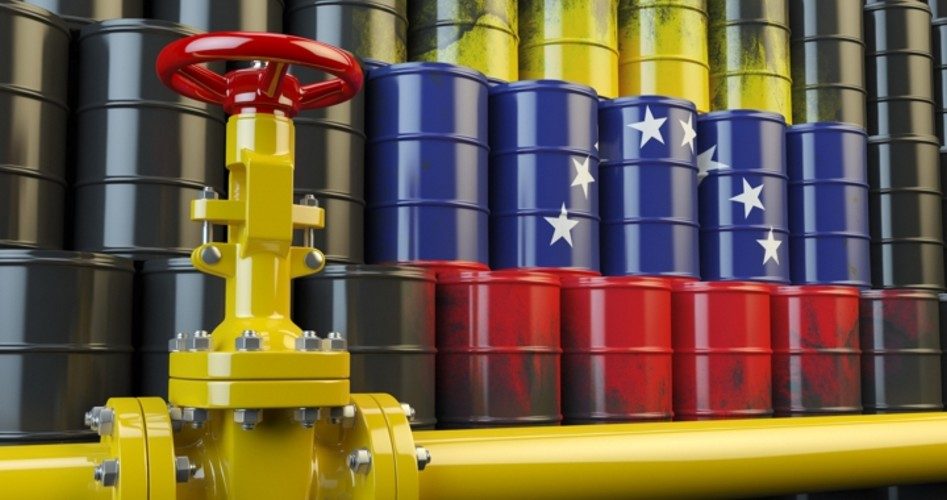
The impact of sanctions applied to Venezuela’s oil company PdVSA is already beginning to be felt, from drivers in Caracas to Gulf Coast refineries to China’s Communist Party head Xi Jinping and Russia’s President Vladimir Putin.
Last Friday, the U.S. Treasury’s Office of Foreign Assets Control (OFAC) finalized the rules relating to the oil embargo on imports of Venezuela’s heavy crude that was announced on Monday: “Until 12:01 a.m. eastern daylight time, April 28, 2019, U.S. persons are authorized to engage in all transactions and activities that are ordinarily incident and necessary to the purchase and importation of petroleum and petroleum products from [Venezuela’s oil company] PdVSA … provided that any payments to PdVSA … are made to a blocked, interest-bearing account located in the United States.” After that date, “purchases by U.S. persons of petroleum and petroleum products from PdVSA … will be prohibited.”
Citgo Petroleum, a subsidiary of PdVSA, along with Valero Energy Corp., Chevron Corp., and PBF Energy Inc. have seen this coming for months and have made contingency plans. Crude imports from Venezuela have been cut in half since 2014 thanks to mismanagement and lack of funds for maintenance of PdVSA’s facilities. For instance, Valero’s senior vice president, Gary Simmons, told investors on Thursday that his company was no longer purchasing any crude at all from PdVSA and has “put alternative sources in place” including shifting its refining capabilities to accept lighter crude from other sources. On Friday, Chevron spokesmen told its investors it too was pursuing contingency plans.
American drivers are unlikely to feel any pinch, as the refineries have been building up an inventory of crude in the event of such a shutoff. Charles Kemp, a vice president at the energy consulting firm Baker & O’Brien, downplayed any impact from the Venezuelan embargo: “The impact of a Venezuelan crude [oil] shortage should have a muted effect on gasoline and diesel prices at least until spring and some of the [excess] inventory is worked off.”
Venezuelan drivers, on the other hand, are feeling the pinch as lines are already forming at gas stations in Caracas and elsewhere. They’re filling up in anticipation of things getting worse than they already are. Said one driver waiting in line, Tomas Pacheco, “Everything is going to get worse…. these long lines are the new normal for us.”
Russia and China have made enormous investments in Maduro’s regime by loaning it billions in exchange for crude oil, a 49.9 percent interest in Citgo, and part interests in some of Venezuela’s vast oil reserves. As the production from PdVSA has declined, Putin has been getting increasingly nervous. Last fall, Igor Sechin, an influential ally of his, arrived in Caracas to complain to Maduro, signaling Moscow’s growing impatience.
And PetroChina has just canceled plans to build a $10 billion heavy crude oil refinery, according to Reuters on Thursday, a tacit recognition of the “new normal” in Maduro’s collapsing world.
Once Maduro is gone (and assuming the new president reverses Maduro’s failing socialist policies) it will still take months to restore PdVSA’s production back to its historical levels. But Venezuela’s proven reserves remain the largest in the world, and demand from the United States and elsewhere will provide the company with plenty of incentive to get back to pumping and exporting its usual three million barrels per day.
As for Russia’s 49.9 percent ownership interest in Citgo, which it holds as collateral for its loans to Maduro’s regime, it could find itself holding an asset worth little thanks to U.S. sanctions. And as China’s economy continues to falter, leadership there may have little interest in attempting to have Venezuela’s new regime repay any or all of the estimated $65 billion it has invested there. It has many more serious problems much closer to home, not to mention the ongoing trade negotiations with President Trump.
As for the Caracas citizens who still can afford to fill up their cars, they appear to be willing to tough it out. As Maria Villasuso, a video producer there, remarked: “Are we going to suffer? Sure, but they are necessary evil. The government is already drowning, and if this ship sinks, so be it. At some point we’ll float again.”
Image: Bet_Noire via iStock / Getty Images Plus
An Ivy League graduate and former investment advisor, Bob is a regular contributor to The New American magazine and blogs frequently at LightFromTheRight.com, primarily on economics and politics. He can be reached at [email protected].
Related article:
U.S. Oil Blockade Puts Existential Pressure on Maduro Regime



